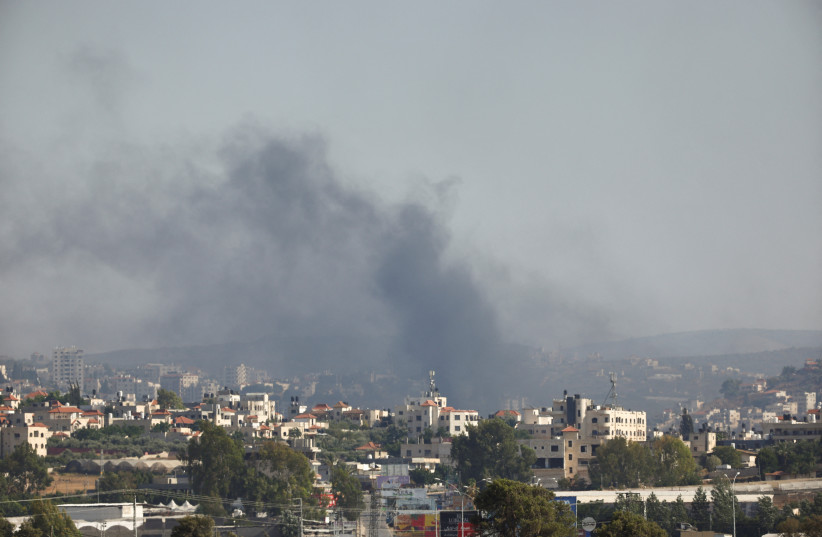Iran has been trying to empower Palestinian Islamic Jihad in the West Bank to create more tensions with Israel closer to Jerusalem and benefit Tehran in the region via diplomatic outreach to various countries.
In the last year, it has increasingly sought to provide terror organizations in the West Bank with weapons and it hopes that the PIJ group could carve out a zone of control that would threaten Israel. The activities of Iran-backed groups, such as PIJ and Hamas benefit Iran because it gives Tehran a way to increase its “unity” of fronts against Israel.
This means that it can add Jenin to other areas, such as Gaza, Southern Lebanon and the Golan border area where Iran has activities and backs threats. In Tehran's long-term view, it may believe it can create conditions in Jenin similar to what it did in southern Lebanon and then Gaza in the 1990s and early 2000s. For now Tehran and Hezbollah appear to be monitoring the situation.
Unifying the fronts, a concept Iran has mentioned in the last months, is one way Iran benefits. This means bringing together threats from Hamas, Hezbollah, PIJ, and others in various places. However, if its tentacles in the West Bank are curtailed then it could lose one of those fronts. However Iran likely calculates that the benefit and risk is more than the reward.
For instance the goal is to embed among civilians and increase the risk for Israeli operations. This also means Iran can leverage this for diplomatic means. Iran operates a diplomatic outreach in the Gulf and hopes that these tensions could harm Israel’s ties to the Gulf. Iran openly says this, recent articles suggest it hopes that it can unite Muslim countries against Israel.

In addition, Iran seeks to use new tactics
After years of seeing drones and missiles frustrated by Israeli defenses, Iran has sought to have its proxy forces, such as PIJ, use explosive devices. The foreshadowing of this came in March with an incident near Megiddo junction.
In its own media, Iran has been a bit circumspect about the Jenin operation. Iran is not yet bragging. It is monitoring the incident and this may reflect that it was taken by surprise. Iran’s proxies among Islamic Jihad clearly want to claim they have not been taken by surprise and Iran’s pro-regime Tasnim media has said this. Iran has in the past sought to cook up a crisis with Israel.
Iran has also seen how Islamic Jihad is generally isolated. Israel launched Shield and Arrow in May against PIJ in Gaza. In early April Hamas launched attacks from Lebanon using rockets and then another group, likely backed by Iran, fired rockets from Syria. What this means is that Iran has often tried to dictate the tempo of threats to Israel.
However, Iran also wants to move slowly as it usually does in the region. This means a combination of Iran’s octopus-like strategy across the region, with a kind of anaconda-like attempt to surround Israel with threats.
Iran combines this with its diplomatic achievements in relations with Saudi Arabia, outreach to Egypt and the Gulf, as well as its strategic ties with Russia and its ties to China. Iran openly brags about these ties. Iran must weigh its diplomatic ties with its response now to what is going on in Jenin.
Meanwhile, Hezbollah has threatened Israel in the wake of the Jenin operation, claiming in Iranian Tasnim News that Israel will “regret” the operation. Iran wants to highlight, via its media and other pro-Iranian media such as Al-Mayadeen, that Israel has been condemned in the region and that Jenin will continue to “resist” and be a “headache” for Israel. While pro-Iranian media may highlight the chances that this operation may “ignite” Gaza, the other context is that Iran has also been monitoring the last two years worth of information coming out after the ten-day conflict in May 2021.
Iran has the motivation to create a crisis in the West Bank. It seeks to bring arms and money to support Islamic Jihad. Iran’s Supreme Leader recently hosted Islamic Jihad leaders in Tehran. The context, therefore, is that Iran knows very well the current situation. It tries to slowly percolate Islamic Jihad to create tensions.
At the same time, it sees benefits in the region, by using a relatively small proxy group to create basically monthly cycles of low-level conflict with Israel. It then measures this conflict to see if it is beneficial. Iran’s regime claims it is benefiting. It would like to move Israel’s focus closer to the West Bank, and therefore away from the wider region.
In essence, Iran would like to turn back the clock to the year 2000, around the time of the Second Intifada, when Israel had left Lebanon and Iran was about to put Hezbollah on steroids. Iran used that to lead to the 2006 war and Israel’s withdrawal from Gaza then led to the 2008-2009 conflict in Gaza. Iran then tried to put Hamas on steroids as well with rocket technology and other support.
Now Iran may think it has a kind of similar recipe for the West Bank.
